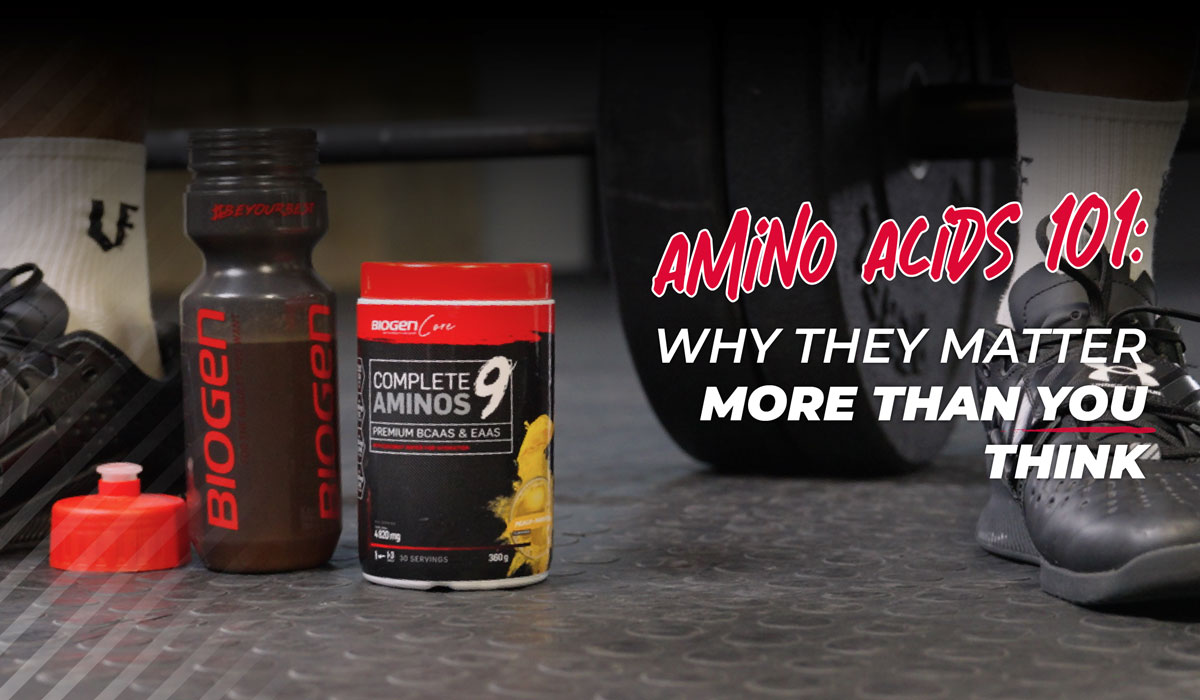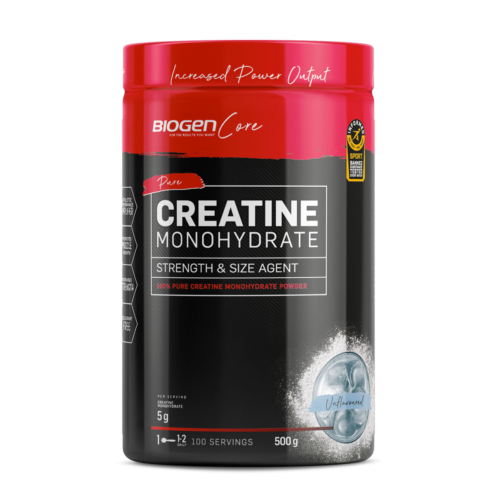
Everything You Need to Know About Amino Acids for Muscle Growth, Energy, and Recovery
Good job on hitting your daily protein target! That’s an important step towards achieving your physique and performance goals, but did you know you could be missing out on additional benefits and better gains by ignoring amino acids?
If you’re serious about maximising your performance, recovery, energy, and preserving hard-earned muscle, then it’s time you considered an amino acid supplement like Biogen Complete 9 Aminos.
Breaking Down Aminos
Amino acids come in different forms – branched, essential, non-essential, conditionally essential – which is why we’re breaking down everything you need to know about these important molecules to help you choose the right product for you.
There are 20 standard amino acids. Each has a different structure and links together in specific sequences to form proteins.
The order and type of amino acids determine the unique shape and function of each protein, and enable them to perform numerous tasks within the body.
For instance, they act as neurotransmitters, signal hormone release, and form components of various cells and structures like haemoglobin, cell membranes and fibrin (for clotting). This is why amino acids are known as the fundamental building blocks of life.
Making Muscle
One of the most important roles amino acids play in the body is building and repairing tissues, including muscle (they are also needed for skin and organs).
Amino acids provide the body with what it needs to make new muscle proteins through a process called muscle protein synthesis (MPS).
When you drink a supplement, the amino acids enter your bloodstream and are transported throughout the body, including to your muscles.
When you lift weights or perform other forms of exercise, it causes microscopic tears in your muscle fibres. This damage signals the body to repair and rebuild the muscle tissue, making it stronger and potentially larger.
Providing your body with the necessary amino acids delivers the building blocks needed for this repair and rebuilding process.
In addition, the body can metabolise some amino acids directly in the muscle to convert them into energy (a process known as gluconeogenesis).
All the Essentials
Among the 20 standard amino acids important for muscle gain, nine are considered essential amino acids (EAA) because our bodies cannot create them from other compounds.
As such, we need to supply our bodies with these important amino acids, which include:
- Histidine
- Isoleucine
- Leucine
- Lysine
- Methionine
- Phenylalanine
- Threonine
- Tryptophan
- Valine
A complete protein contains all nine EAAs, which are usually animal-derived sources like meat and dairy. An incomplete protein (typically a plant-based protein) lacks one or more EAA or may have them in limited quantities.
Building with BCAAs
Among the nine EAAs, there are three that play important roles in muscle building. They are known as the branched-chain amino acids (BCAA) due to their unique structure – a basic tree with branches. The three BCAAs include:
- Leucine
- Isoleucine
- Valine
Providing additional BCAAs, particularly leucine, can boost the MPS process after exercise. A study¹ published in Frontiers in Physiology confirmed that ingesting 5.6g of BCAAs after a strength-training session led to 22% greater MPS.
Higher leucine levels indicate to the body that there is sufficient protein available to create new muscle. The industry standard – and the one used in Biogen Complete 9 Aminos – is a 2:1:1 leucine-to-isoleucine-to-valine ratio, as it has significant research² backing its efficacy.
Supplement Science
Amino acid supplements aim to make this process more efficient by providing the body with the amino acids already in their individual form – no breaking down of proteins needed!
When we drink an amino acid supplement like Biogen Complete 9 Aminos before and during training, we provide all nine EAAs our body requires.
The International Society of Sports Nutrition’s position stand on protein and exercise³ affirms that you need an abundant supply of all the EAAs to stimulate MPS, stating that: “Rapidly digested proteins that contain high proportions of EAAs and adequate leucine, are most effective in stimulating MPS.”
The body draws from this circulating amino acid pool to start repairing muscle tissue sooner, and also helps to limit the amount of damage that occurs during and after training.
Known as the muscle-sparing effect, circulating amino acids can protect muscle tissue, especially during exercise, calorie restriction, or periods of fasting, with amino acid supplements, especially EAAs and BCAAs, ideally suited to play a key role in this process.
As such, adding amino acids to your routine before and during long workouts or during calorie-cutting phases can help your body perform and recover without tapping into precious muscle tissue for fuel.
When to Take Your Aminos
Based on these potential benefits, there are specific times to take an EAA supplement to achieve your specific goals.
Before or during a workout is the most effective option to support endurance and reduce muscle breakdown. This is the ideal approach for strength training, endurance sports, or other forms of intense physical activity.
You can support the muscle repair and recovery process and potentially reduce next-day muscle soreness⁴ by taking an amino acid supplement after training and periodically throughout the rest of the day.
Selecting the Best Option
A comprehensive amino acid supplement like Biogen Complete 9 Aminos provides all the EAAs and BCAAs your body needs, and in the right ratio, to support your energy needs, spare muscle tissue during training, and support muscle growth and recovery after.
It is also suitable for anyone who struggles to meet their daily protein needs and could benefit from additional nutritional support in a convenient and tasty daily drink.
References:
- Jackman SR, Witard OC, Philp A, Wallis GA, Baar K and Tipton KD (2017) Branched-Chain Amino Acid Ingestion Stimulates Muscle Myofibrillar Protein Synthesis following Resistance Exercise in Humans. Front. Physiol. 8:390. doi: 10.3389/fphys.2017.00390.
- Campbell B, Kreider RB, Ziegenfuss T, La Bounty P, Roberts M, Burke D, Landis J, Lopez H, Antonio J. International Society of Sports Nutrition position stand: protein and exercise. J Int Soc Sports Nutr. 2007 Sep 26;4:8. doi: 10.1186/1550-2783-4-8. PMID: 17908291; PMCID: PMC2117006.
- Jäger R, Kerksick CM, Campbell BI, Cribb PJ, et al. International Society of Sports Nutrition Position Stand: protein and exercise. J Int Soc Sports Nutr. 2017 Jun 20;14:20. doi: 10.1186/s12970-017-0177-8. PMID: 28642676; PMCID: PMC5477153.
- Weber MG, Dias SS, de Angelis TR, Fernandes EV, Bernardes AG, Milanez VF, Jussiani EI, de Paula Ramos S. The use of BCAA to decrease delayed-onset muscle soreness after a single bout of exercise: a systematic review and meta-analysis. Amino Acids. 2021 Nov;53(11):1663-1678. doi: 10.1007/s00726-021-03089-2. Epub 2021 Oct 20. PMID: 34669012.












